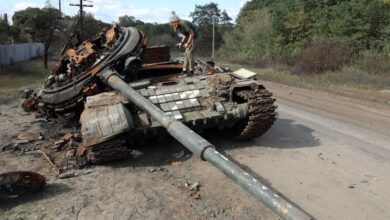Iran Quds Force commander Qassam Soleimani killed in US airstrike near Baghdad
US strike near Iraqi capital also killed Kataib Hezbollah commander Abul Mahdi al-Muhandis
Qassam Soleimani, commander of Iran’s elite Quds Force and the general responsible for the Islamic Revolutionary Guard Corps clandestine operations in the region, was killed in a U.S. airstrike in Iraq early on Friday, January 3.
Iranian state TV first confirmed that General Soleimani was killed in the strike on his convoy at Baghdad international airport, which also killed Abul Mahdi al-Muhandis, leader of the powerful Hashd al-Shaabi militia Kataib Hezbollah.
A U.S. Department of Defense statement said President Donald Trump ordered the strike to kill Solemani, who it was “actively developing plans to attack American diplomats and service members in Iraq and throughout the region.”
The strike was “aimed at deterring future Iranian attack plans,” the Pentagon said, accusing Soleimani of approving an attack on the U.S. embassy in Baghdad earlier this week and of “orchestrating” missile strikes on Iraqi bases housing the U.S.-led Coalition against Islamic State, including at the K1 base near Kirkuk last month that killed an American contractor and wounded Iraqi Security Forces and U.S. military personnel.
A spokesperson for the Coalition could not immediately be reached for comment.
Demonstrations broke out at the embassy on December 30 in reaction to a series of U.S. strikes against Kataib Hezbollah forces in Iraq and Syria. Protesters, including some carrying Kataib Hezbollah and other Hashd al-Shaabi flags, attempted to storm the embassy and set fires outside.
Muhandis, deputy and de facto commander of the Hashd, also called the Popular Mobilization Units, had vowed revenge on the U.S. for the strikes.
Many of the Hashd al-Shaabi militias were folded into the Iraqi Security Forces last year, but Kataib Hezbollah has maintained strong ties to Iran’s Islamic Revolutionary Guard Corps. The Quds Force which 62-year-old Soleimani headed is the IRGC’s external arm, and the commander freely traveled around Iraq and Syria for years. The Trump administration designed the IRGC a foreign terrorist organization in July.
IRGC General Mohsen Razaee vowed “revenge” on the U.S. for killing Soleimani.
“There’s a reason why previous administrations did not escalate to the level of assassinating Soleimani,” said Elizabeth Dent, a non-resident scholar Middle East Institute’s Countering Terrorism and Extremism program and former Special Assistant to the Special Presidential Envoy to the Global Coalition to Defeat ISIS.
Dent warned of “tit for tat escalation,” and said, “I can’t imagine this ends well for anyone.”
Iraqi caretaker Prime Minister Adel Abdul Mahdi called the killings of Soleimani and al-Muhandis a “dangerous escalation” and called for an emergency session of parliament. Mahdi had already advocated for a review of the U.S. military presence in Iraq following the weekend strikes.
Iran’s clandestine operations in the Middle East
As the head of the Quds Force, Soleimani was responsible for Iran’s proxies in the Middle East, including Lebanese Hezbollah as well as pro-Iran militias who fought on behalf of President Bashar al-Assad’s regime in Syria. The IRGC has been accused of giving advanced military technology that Yemen’s Houthi rebels use to attack Saudi Arabia, and of orchestrating attacks against America’s Gulf allies in the region.

Brigadier General Esmail Qaani will replace Soleimani, Fars News reported.
Iranian Supreme Leader Ayatollah Ali Khamenei declared three days of public mourning and swore vengeance against the “criminals” behind Soleimani’s death.
Foreign Minister Javad Zarif tweeted that the strike was “extremely dangerous & a foolish escalation.”
“The U.S. bears responsibility for all consequences of its rogue adventurism,” he said.
Earlier this week the Pentagon deployed Marines to Iraq in response to the embassy attack and sent additional forces to the region.
82nd Airborne Division troops arrived in Kuwait on Thursday.
“Their deployment in support of U.S. Central Command is a precautionary action taken to respond to increased threat levels against U.S. personnel and facilities,” the 82nd Airborne Division said.
Israel claims preemptive strike on Iranian drone operation in Syria
This story was updated throughout the day on January 3, 2020.












